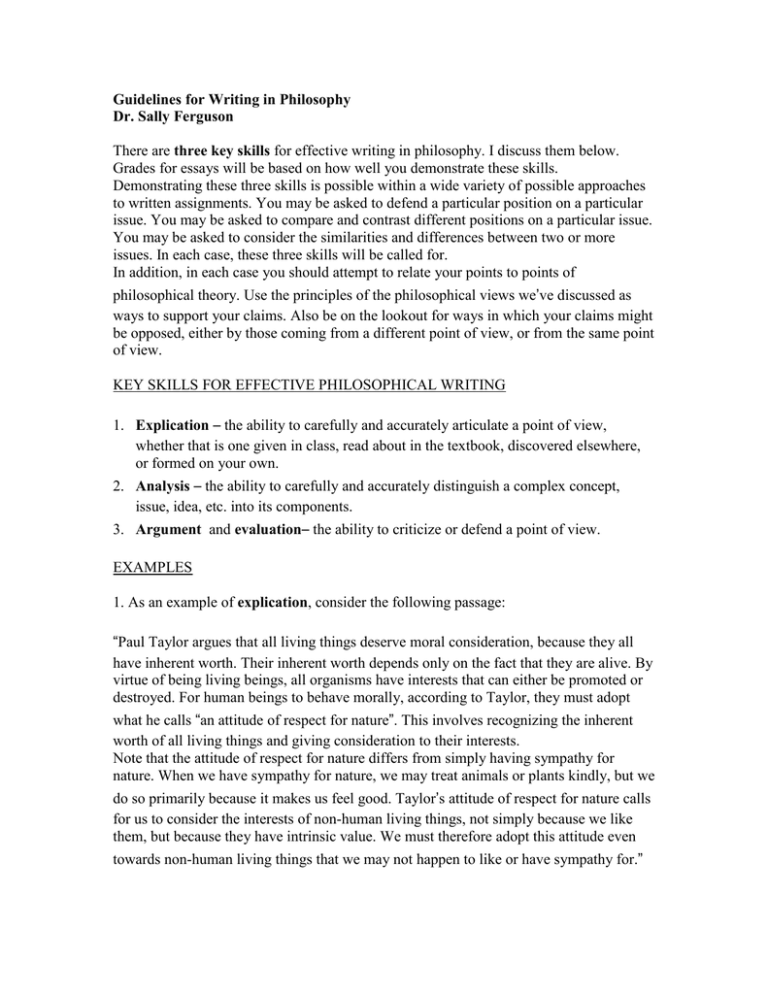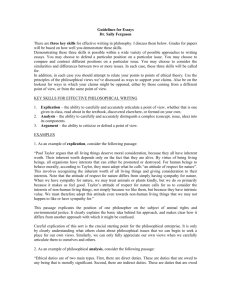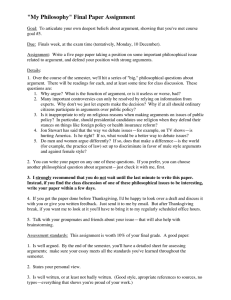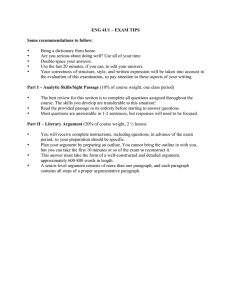Guidelines for Writing in Philosophy Dr. Sally Ferguson three key skills
advertisement

Guidelines for Writing in Philosophy Dr. Sally Ferguson There are three key skills for effective writing in philosophy. I discuss them below. Grades for essays will be based on how well you demonstrate these skills. Demonstrating these three skills is possible within a wide variety of possible approaches to written assignments. You may be asked to defend a particular position on a particular issue. You may be asked to compare and contrast different positions on a particular issue. You may be asked to consider the similarities and differences between two or more issues. In each case, these three skills will be called for. In addition, in each case you should attempt to relate your points to points of philosophical theory. Use the principles of the philosophical views we’ve discussed as ways to support your claims. Also be on the lookout for ways in which your claims might be opposed, either by those coming from a different point of view, or from the same point of view. KEY SKILLS FOR EFFECTIVE PHILOSOPHICAL WRITING 1. Explication – the ability to carefully and accurately articulate a point of view, whether that is one given in class, read about in the textbook, discovered elsewhere, or formed on your own. 2. Analysis – the ability to carefully and accurately distinguish a complex concept, issue, idea, etc. into its components. 3. Argument and evaluation– the ability to criticize or defend a point of view. EXAMPLES 1. As an example of explication, consider the following passage: “Paul Taylor argues that all living things deserve moral consideration, because they all have inherent worth. Their inherent worth depends only on the fact that they are alive. By virtue of being living beings, all organisms have interests that can either be promoted or destroyed. For human beings to behave morally, according to Taylor, they must adopt what he calls “an attitude of respect for nature”. This involves recognizing the inherent worth of all living things and giving consideration to their interests. Note that the attitude of respect for nature differs from simply having sympathy for nature. When we have sympathy for nature, we may treat animals or plants kindly, but we do so primarily because it makes us feel good. Taylor’s attitude of respect for nature calls for us to consider the interests of non-human living things, not simply because we like them, but because they have intrinsic value. We must therefore adopt this attitude even towards non-human living things that we may not happen to like or have sympathy for.” This passage explicates the position of one philosopher on the subject of animal rights and environmental justice. It clearly explains the basic idea behind his approach, and makes clear how it differs from another approach with which it might be confused. Careful explication of this sort is the crucial starting point for the philosophical enterprise. It is only by clearly understanding what others claim about philosophical issues that we can begin to seek a place for our own views. Similarly, we can only fully appreciate our own views when we carefully articulate them to others and ourselves. 2. As an example of philosophical analysis, consider the following passage: “Ethical duties are of two main types. First, there are direct duties. These are duties that are owed to any being that is morally significant. Second, there are indirect duties. These are duties that are owed to any being that itself is not morally significant, on the basis of the fact that our treatment of that being affects those who are morally significant.” The analysis seen in this passage consists of breaking down the complex concept of ethical duty into two component parts: direct and indirect duties. It then explicates each of those components. Careful analysis of this sort is at the heart of the philosophical enterprise. It is only by carefully breaking down complex ideas that we can achieve clear thinking about difficult issues, and begin to see where our own positions (as well as those of others) have strengths and weaknesses. 3. Finally, as an example of philosophical argument, consider the following passage: “Most sexual harassment policies focus on the fact that sexually harassing behavior is unwelcome to the one who is harassed. I argue, however, that this focus will not allow us to define an adequate sexual harassment policy. For one thing, it fails to capture some cases of sexual behavior that are clearly wrong. As an example, consider the case of a secretary who fears that she cannot win a promotion based on her work performance alone. Imagine further that her boss comes to her and suggests that she might be able to receive the desired promotion, if she is willing to engage in certain sexual activities with him. In this situation, the secretary may very well “welcome” this advance, since she sees it as her best chance to receive the desired promotion. However, it is clearly a case of sexual harassment.” This passage sets up a thesis: the “unwelcomeness criterion” for sexual harassment is not the correct basis for setting up an adequate policy. It then backs up that thesis by way of an argument, which claims that this criterion only captures some, not all, cases of harassment. It then provides an example of a case that might not be captured by that criterion. Of course, this argument may be sound or it may not be. I offer it as an example of what constitutes an argument, and not necessarily as an example of an irrefutable argument. Further analysis and argument would probably be required to make a good case. For example, we might ask the author why she claims that the case described is a case of harassment, if it is not unwelcome. She might respond in a number of ways. The minimal requirement for each of you is that when you offer a thesis or make a claim, you also make an attempt to justify that claim by means of some argument or evidence. The better the argument or evidence, the better! THE CHIEF VIRTUE OF PHILOSOPHICAL WRITING In addition to these keys skills, there is one virtue that is paramount in philosophical writing, and that is the virtue of intellectual charity. To have intellectual charity means you do not treat the views of those with whom you disagree as idiotic. You do not caricature their position. Instead, you make an effort to depict their position realistically, with sympathy for what motivates them to hold their views, even though you disagree with them. When you have intellectual charity, you do not argue against a “straw man”, i.e., a version of your opponent’s argument that is ridiculously weak. Instead, you try to portray her position as strongly as possible. What is the advantage of that, you might say, since it makes it more difficult to argue against it? One reason is this: there is no real benefit to in you knocking down a straw man. Think of constructing an argument on analogy with physical training: what is the point in exercising with tiny weights that will provide you little opportunity to develop greater strength? The same principle applies in intellectual practice. You can only benefit (in terms of learning and intellectual growth) if you challenge yourself against arguments that are strong and avoid the temptation to knock down only “straw men”. Another reason is this: When you argue against a straw man of your opponent, you may fool some folks into thinking that you are right. There is a big difference, however, between seeming to be right, and actually being right. The goal of philosophical reasoning is to reach the conclusion that is right (or to get as close to it as we can!), and not simply to fool others into thinking that we are right. Here's a quick run-down of how to compose a successful critical commentary, focusing especially on the virtue of charity, from philosopher Daniel Dennett: "1. You should attempt to re-express your target’s position so clearly, vividly, and fairly that your target says, “Thanks, I wish I’d thought of putting it that way." 2. You should list any points of agreement (especially if they are not matters of general or widespread agreement). 3. You should mention anything you have learned from your target. 4. Only then are you permitted to say so much as a word of rebuttal or criticism."








